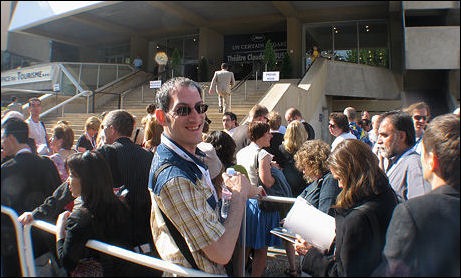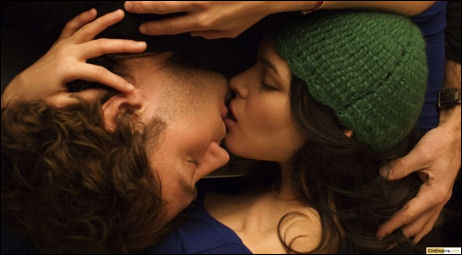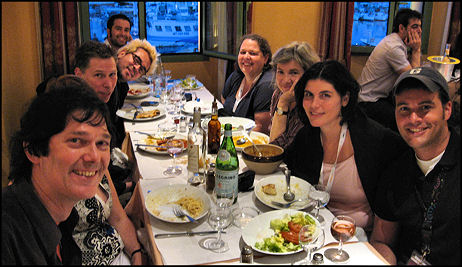Looking east from the American Pavillion beach about three hours ago. I’ll most likely work up some ambition later today or tomorrow and tape something of interest. Hey, maybe even an interview. But no jiggly hand-held stuff.
Smiling Man

Ten minutes before the start of Wong Kar Wai’s My Blueberry Nights in front of the Salle Debussy, and the tan-suited festival officials were still keeping everyone with pink press passes in a long long cattle line outside. Elite journos with white passes and pink passes with a yellow dot are always let in first. Snapped today — Wednesday, 5.16.07 — at 9:50 am
Log-on problems
One of the reasons it took so long to get rolling today in Cannes (apart from being occupied this morning with seeing Wong Kar Wai‘s My Blueberry Nights, a mystifying shortfall for a respected, world-class director and a full-on mediocrity that comes close to being a rank embarassment) is the absurd wi-fi situation at the American Pavillion and, for what I’ve been told, inside the Grand Palais press room also.

Everyone with a badge has been given a five-digit user ID and a three-digit password, and none of them work. But the AMPAV tech-head volunteers have a list of five-digit and three-digit codes that do work…as long as nobody else tries to log on with the same numbers. Except everyone at the American Pavillion is going up to these volunteers and asking for working code groups and using them, and every time a new person logs on with a given code it kicks off the previous person who used the same numbers.
Right now I’m connected with a 19585 user ID and an 871 password, but if somebody else comes along and logs on with these numbers, I’ll get kicked off. This has happened to me seven times within the past hour, and I in turn have kicked off seven oothers. It’s obviously insane all over here, and the situation won’t be fixed, I’m told, until later this afternoon, which is a euphemism, I’m sure, or sometime tonight or tomorrow morning.
La PIzza gang

A gathering of like-minded souls at La Pizza — Tuesday, 5.15.07, 8:40 pm. (l. to r.) Toronto Star critic Peter Howell, friendly face whose name strangely escapes due to jet-lag mind melt, Santa Barbara Film Festival director and AMPAV event booker Roger Durling (blond hair, glasses), SBFF’s Jeremy Platt, AMPAV publicist Carol Marshall, Variety columnist Anne Thompson, Toronto Film Festival communications chief Andrea Grau, and Grau’s good friend Noah (his last name has also vaporized). And brief grainy video taken around the same time.
Bern, Seitzerland

Transfer at Bern, Switzerland, which has a sizable air terminal, a Luftahansa steward having described it as “small” — 5.15.07, 3:05 pm
Thompson talks to Moore
Before before she flew to Cannes on Sunday, Variety‘s Anne Thompson got Michael Moore on the phone to talk about the early-bird attacks on Sicko, his health-care doc that will screen in Cannes within a few days, and particularly Moore having taken ailing workers from Ground Zero in Manhattan to Cuba for free medical treatments. Here’s Fred Thompson‘s National Review attack piece. Here’s Moore’s official responses so far, and a bunch of links besides.
“The Sopranos” ain’t doin’ it
Paulie Walnuts‘ adoptive mom died on The Sopranos the night before last, and what else? A.J. got into some pronounced gangster action and “Christophuh” upped the ante on his end, but storm clouds aren’t assembling overhead and nothing is really happening in any kind of knockout-punch way, and it’s looking more and more like the Big Finale won’t actually materialize.
L.A. Times writer Mary McNamara has written that “the entire [final] season has seemed pure prologue, spotlighting one force, then another, which may or may not be the agent of Tony’s doom,” and also that “the rumor is that there will be no final cataclysmic event.” It’s almost as if Sopranos creator and producer David Chase is getting off on not delivering the whopping chest-punch thing that the fans have been waiting for. The season hasn’t ended so it’s too early to call him obstinate and perverse, but…
Lufthansa Speed Bump
Something sudden and surprising did happen. My Lufthansa flight from JFK — due to leave the ground last night at 8 pm, but delayed an hour — arrived a little late in Munich, and I missed my connecting flight to Nice, which I had only a half-hour to get to. I was one of the first passengers off the plane and I ran through the airport like Peyton Manning, but the passport line and the re-scanning security process slowed things down considerably.

The only decent option is to take a short flight to Basel, Switzerland, and then I’ll have to get off and grab another jet (on another airline) to Nice, getting me there around 5 pm. The Cannes press office is open until 8 pm, however, so at least I’ll get myself credentialed so I can make the first screening tomorrow morning at 8:30.
The first social function of the festival happens tonight at La Pizza, a big noisy restaurant that serves great pizza and offers a view of the Cannes marina. I’m meeting the Toronto Star‘s Peter Howell, Variety‘s Anne Thompson, Toronto Film Festival communcations chief Andrea Grau, Santa Barbara Film Festival director Roger Durling, and the Hollywood Reporter‘s Gregg Goldstein for food and drink at 7:30.
“Brokeback” lawsuit
A 12 year-old girl and her conservative grandparent custodians have filed a redstate-bluenose lawsuit over a substitute teacher showing Brokeback Mountain to a class of eighth-graders. My God…exposing 12 and 13 year-olds to a discreet dramatization of a tragic gay relationship? Not to mention saturating their heads with the perverse notion that life is short and we should all go for the gusto and the passion while we can? I’m thoroughly disgusted.
Edward Klein, an Oregon reader who sent me the link, says that “if true, the teacher was way out of line to show this film to this class, but the girl suffering ‘psychological distress’ seems extreme at best. Her grandparents are religious conservatives and have complained about inappropriate reading material, which makes my liberal antenna stand up.”
Mailer and “Tough Guys”
“Tarantino before its time…long, florid dialogue punctuated by grotesque violence followed by more long, florid dialogue and then more grotesque violence.” — Telluride Film Festival honcho Tom Luddy describing Norman Mailer‘s Tough Guys Don’t Dance (’86). The quote is from a Mark Singer New Yorker piece about a Tough Guys Don’t Dance reunion that happened last year. (I was the in-house Cannon publicity press-kit writer at the time, and I got to interview Mailer at some length while working on the notes for the film. I was always pleased that fate allowed this to happen.)
Bloom in a lull
“It is the first time in eight years that I haven’t got an acting job which I am immediately going in to,” Orlando Bloom tells The Scotsman‘s Garth Pearce. “I celebrated my 30th birthday in January and it feels different. It is less urgent. It is now time for reflection and to ask myself: ‘How much living do you want to do?’ As much as working has been my life, there is now a shift in my priorities.”

In other words, Bloom is in a career lull. Things haven’t been happening for the guy since the Big Tumble-Down of ’05 when Kingdom of Heaven, in which Bloom had the lead role, bombed (despite the director’s cut of that Ridley Scott film being a near-masterpiece), and then Elizabethtown, which Bloom also carried on his shoulders, turned into the biggest high-expectation wipeouts of all time. In essence, the industry jury was deliberating two years ago whether Bloom was in fact a leading man, and now they’re really deliberating this.
Subway video
I’ve taken video-editing tutorials from four different people (one in L.A., three in NYC), and at least some of it is seeping in. I’ve been a little hesitant about posting video, but I think the key to getting past that is just admitting that some of the early MPEG4 files are going to be borderline inane. No, wrong description…how about underwhelmingly austere? I took this today not with the video camera that I’ll be using in Cannes but with the Canon A540, my no-big-deal digital photo camera that has a video option.

